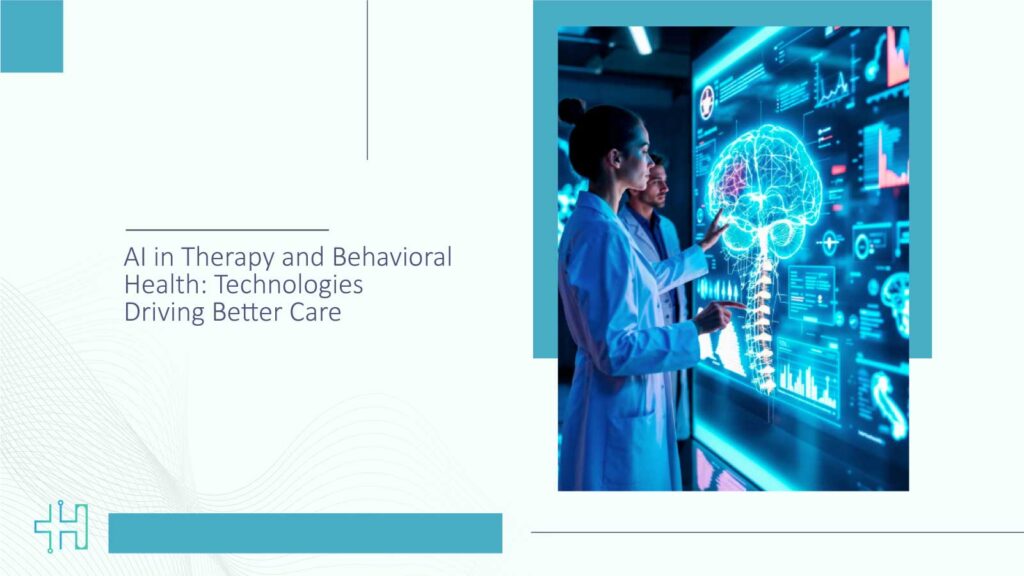Artificial intelligence (AI) and healthcare have evolved from a futuristic concept into a tangible force reshaping how we approach mental health and behavioral care. AI in behavioral health and therapy is a catalyst driving more personalized, accessible, and effective treatment options.
As mental health crises escalate, amplified by global stressors like the pandemic, technology’s role becomes even more critical. Could AI-powered tools be the solution to bridging gaps in mental health services?
Let’s explore how these innovative technologies are transforming behavioral health care and what that means for clinicians, patients, and industry leaders alike.
The Rise of AI in Mental Health
Artificial intelligence refers to computer systems capable of performing tasks that typically require human intelligence, such as understanding natural language, recognizing patterns, and making decisions. In mental health, AI applications are diverse, ranging from conversational chatbots providing support to sophisticated algorithms predicting patient risks.
Key AI Technologies Transforming Behavioral Health
1. AI Chatbots and Virtual Therapists
One of the most visible applications of AI in mental health is chatbot-based therapy. These AI-powered virtual assistants can engage users in conversations, offer coping strategies, and provide emotional support 24/7. Examples include Woebot and Wysa, which utilize cognitive-behavioral techniques to help users manage anxiety and depression.
2. Predictive Analytics for Early Intervention
AI models analyze large datasets, such as electronic health records, social media activity, and wearable device data, to identify early signs of mental health deterioration. This enables proactive interventions before crises occur, potentially saving lives.
3. Personalized Treatment Plans
AI can tailor therapy approaches based on individual patient data, optimizing outcomes. Machine learning algorithms analyze patterns to recommend specific interventions, medications, or behavioral strategies suited to each patient’s unique profile.
4. Remote Monitoring and Support
Wearables and mobile apps collect real-time data on sleep, activity, and mood, feeding into AI systems that monitor progress and alert clinicians to concerning changes.
Benefits of AI in Behavioral Health
Increased Accessibility
AI tools can reach underserved populations and those reluctant to seek traditional therapy due to stigma or logistical barriers.
Cost-Effective Care
Automating routine assessments and interventions reduces costs and resource burdens on healthcare systems.
Enhanced Personalization
Data-driven insights enable more precise, individualized treatment plans.
24/7 Support
AI-powered tools provide immediate assistance outside office hours, addressing urgent needs.
Challenges and Ethical Considerations
Despite promising advancements, integrating AI into mental health care raises important concerns:
Data Privacy
Ensuring patient confidentiality and secure data handling is paramount.
Accuracy and Bias
AI models must be trained on diverse datasets to prevent biases and inaccuracies.
Human Element
AI should complement, not replace, human clinicians, preserving empathy and nuanced understanding.
Regulation
Clear guidelines are needed to evaluate and approve AI tools for clinical use.
The Future of AI in Behavioral Health
Looking ahead, AI’s role in mental health is poised to expand further. Emerging technologies like natural language processing (NLP) will enhance chatbot empathy and understanding.
Integration with virtual reality (VR) may offer immersive therapeutic experiences. Additionally, ongoing research aims to refine predictive models for better risk assessment.
Conclusion
AI is undeniably transforming the landscape of behavioral health, offering innovative solutions to longstanding challenges. When implemented thoughtfully and ethically, AI has the potential to augment mental health services, making care more accessible, personalized, and effective.
As technology evolves, collaboration between clinicians, technologists, and policymakers will be essential to harness AI’s full potential and ensure it serves the best interests of patients worldwide.
Dive deeper into the future of healthcare. Keep reading on Health Technology Insights.
To participate in our interviews, please write to our HealthTech Media Room at info@intentamplify.com








